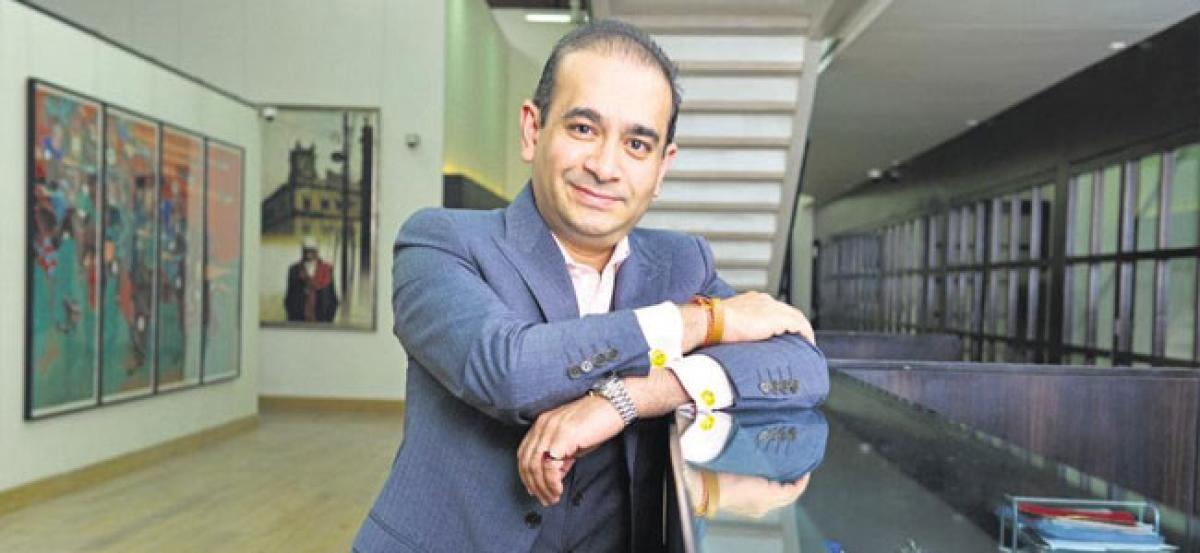Live
- Another tigress released in soft enclosure in Similipal
- Cong, BJP leaders’ rush to join AAP shows we are winning Assembly polls: Kejriwal
- Janajatiya Gaurav Diwas: PM Modi’s selfie with members of Irula tribe draws attention
- Bolivian Opposition leaders arrested on terrorism charges
- 1 in 5 IT decision-makers struggling to find AI/ML talent: Report
- India's economy in sweet spot with strong growth, inflation likely to ease: Moody’s
- Mani Shankar Aiyar questions Jaishankar's visit to Pakistan, says he created 'false hope'
- K.T. Rama Rao calls on farmers arrested for attack on Vikarabad officials
- AP CM Chandrababu Naidu Unveils Vision for Andhra Pradesh amidst Financial Challenges
- VVS Laxman lauds fans for massive support on foreign tours
Just In

The Enforcement Directorate (ED) is set to “confiscate” assets worth over Rs 15,000 crore as part of its first action against absconders such as liquor baron Vijay Mallya and diamantaire Nirav Modi under the recently promulgated Fugitive Economic Offenders Ordinance.
While Rs 9,890 crore worth of assets have been attached by the ED in the Mallya case, properties worth Rs 7,664 have been attached in the Nirav Modi-Mehul Choksi case.
The Enforcement Directorate (ED) is set to “confiscate” assets worth over Rs 15,000 crore as part of its first action against absconders such as liquor baron Vijay Mallya and diamantaire Nirav Modi under the recently promulgated Fugitive Economic Offenders Ordinance.
Officials said the agency has begun the work to bring together the existing cases of high-value fugitives and bank loan defaulters and it will soon approach various special anti-money laundering courts in the country to get orders issued against them under the new ordinance.
They said the money laundering cases against Vijay Mallya, who is now based in London, Nirav Modi and his uncle Mehul Choski, Winsome Diamond company promoter Jatin Mehta and others are expected to be picked up first for action.
The ED is the empowered agency to enforce the new ordinance.
Under the new ordinance, the officials said, all the assets of such an absconder, both in India and abroad, which have or have not been attached by the Enforcement Directorate under the Prevention of Money Laundering Act (PMLA), will be confiscated immediately.
The case of Modi and Choksi will be processed under the new ordinance, once the CBI and the ED file their respective charge sheets against them, they said.
While Rs 9,890 crore worth of assets have been attached by the ED in the Mallya case, properties worth Rs 7,664 have been attached in the Nirav Modi-Mehul Choksi case.
In the first go, they said, it is estimated that over Rs 15,000 crore worth of assets could be confiscated by the ED under the provisions of the ordinance, aimed at those who flee the country after defaulting on multi-crore bank loans and similar instances of fraud.
The other such cases will be taken up gradually, they added.
Under the PMLA, the ED could only confiscate the assets once the trial in a case finishes which usually takes a long time, they said.
President Ram Nath Kovind, last Sunday, had given assent to promulgation of the Fugitive Economic Offenders Ordinance, 2018, giving authorities powers to attach and confiscate the proceeds of crime and properties of economic offenders.
The ordinance is aimed at deterring economic offenders from evading the process of law by remaining outside the jurisdiction of Indian courts.
The government brought the ordinance as “there have been instances of economic offenders fleeing the jurisdiction of Indian courts, anticipating the commencement, or during the pendency, of criminal proceedings,” the government said.
The rationale behind the law, the government said, was the absence of such offenders from Indian courts which hampers investigation and wastes court time and undermines the rule of law.
“The existing civil and criminal provisions in law are not entirely adequate to deal with the severity of the problem,” it said.
The Fugitive Economic Offenders Bill, 2018 was introduced in the Lok Sabha on March 12 but couldn’t be taken up due to logjam in Parliament over different issues.
With Parliament being adjourned sine die, an ordinance was proposed.
The Union Cabinet on April 21 approved the ordinance and the President gave his assent to promulgation of the same a day later.
The ordinance makes provisions for special courts under the Prevention of Money Laundering Act, 2002 to declare a person as a fugitive economic offender.
“A Fugitive Economic Offender is a person against whom an arrest warrant has been issued in respect of a scheduled offence and who has left India so as to avoid criminal prosecution, or being abroad, refuses to return to India to face criminal prosecution,” the government statement said.
However, only cases of frauds, cheque dishonour or loan default of over Rs 200 crore would come under this ordinance.
The ordinance provides for all necessary constitutional safeguards in terms of providing hearing to the person through counsel, allowing him time to file a reply, serving notice of summons to him, whether in India or abroad and appeal before the High Court.
The government had said the new law would help banks and other financial institutions to achieve higher recovery from financial defaults committed by fugitive economic offenders, improving the financial health of such institutions.

© 2024 Hyderabad Media House Limited/The Hans India. All rights reserved. Powered by hocalwire.com







